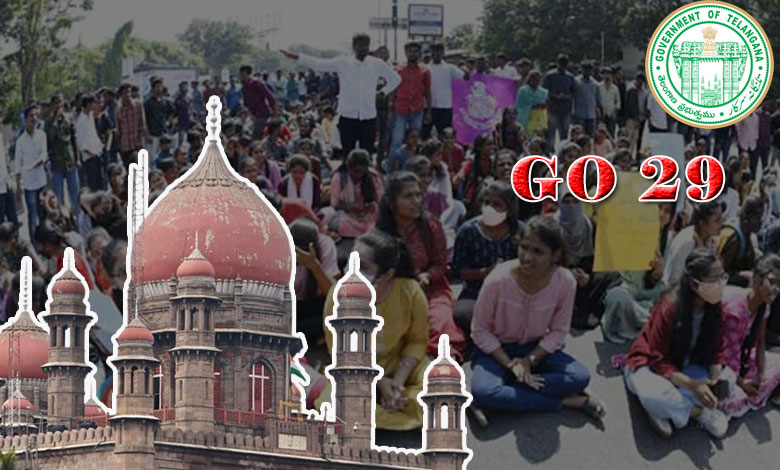Group-1 Candidates in Telangana Anxiously Await High Court Decision on GO 29
The Telangana government’s decision to proceed with the examinations without resolving concerns related to GO 29, a government order tied to reservation policies, has sparked widespread agitation and legal battles.

Hyderabad: The controversy surrounding GO 29 in Telangana continues to fuel tension among Group-1 exam candidates, even after the completion of the mains exams.
The Telangana government’s decision to proceed with the examinations without resolving concerns related to GO 29, a government order tied to reservation policies, has sparked widespread agitation and legal battles.
On November 20, the High Court of Telangana postponed its hearing on GO 29 to November 26, leaving candidates in a state of uncertainty.
Table of Contents
What is GO 29?
GO 29 is a government order introduced by the Telangana government, reportedly concerning reservation policies and procedural reforms. The order has faced backlash from several candidates who believe it results in discrimination against marginalized groups and violates their rights. Candidates argue that conducting the Group-1 exams without addressing the issues raised by GO 29 undermines fairness and inclusivity.
Candidates’ Legal Battle Against GO 29
Over the past few months, candidates have been fighting a legal battle to challenge GO 29. The situation escalated in October 2024, when the Telangana government went ahead with conducting the Group-1 mains exams, despite ongoing protests and unresolved legal challenges.
Many candidates approached the Supreme Court, seeking intervention to halt the exams. However, the Supreme Court dismissed their plea, stating that the matter should be resolved in the High Court of Telangana. This ruling left candidates with no option but to pin their hopes on the High Court, which is now deliberating the validity of GO 29.
High Court Adjourns Hearing to November 26
On November 20, the Telangana High Court was scheduled to hold a crucial hearing on GO 29. However, the case was adjourned to November 26, prolonging the uncertainty for candidates. The adjournment has heightened tensions among aspirants, many of whom are worried about the implications of GO 29 on the results of the Group-1 mains exams and future recruitment processes.
Impact on Group-1 Mains Exam Candidates
The postponement of the hearing has left Group-1 candidates in limbo. Although the mains exams have concluded, many candidates believe the exams should be nullified and re-conducted if GO 29 is found to be flawed. The controversy has caused significant stress for aspirants, many of whom have invested years preparing for these competitive exams.
The political dimension of the issue has further complicated matters. Opposition parties in Telangana have rallied behind the protesting candidates, accusing the state government of disregarding social justice and undermining the rights of marginalized groups. Several candidates and advocacy groups have staged protests, demanding immediate action to address their grievances.
Also Read: Telangana Plans New 800-MW Power Station in Ramagundam Amid Controversy Over Procedures and Ownership
Government’s Stance and Response
Despite the backlash, the Telangana government has defended its decision to conduct the Group-1 mains exams as scheduled. Officials argue that the exams were conducted smoothly and that any challenges to GO 29 will be resolved through the judicial process.
The government’s approach, however, has done little to ease the concerns of candidates. Critics have accused the administration of rushing the exams without adequately addressing the legal and social implications of GO 29.
Protests and Political Reactions
The controversy surrounding GO 29 has sparked widespread agitation among candidates and attracted significant political attention. The issue has become a flashpoint for opposition parties, who have criticized the government’s handling of the matter.
Several prominent leaders have expressed solidarity with the protesting candidates. Opposition parties have argued that GO 29 disproportionately affects candidates from economically and socially disadvantaged backgrounds, further exacerbating inequality.
In response to these allegations, the government has reiterated its commitment to ensuring a fair and transparent recruitment process. However, this assurance has done little to quell the protests, which continue to gain momentum.
What’s Next?
The High Court’s decision on November 26 is expected to be a turning point in the GO 29 controversy. Candidates and political observers alike are closely watching the proceedings, as the verdict could have far-reaching implications for Group-1 recruitment and future government policies on reservations.
If the High Court rules against GO 29, it could potentially invalidate the recently conducted Group-1 mains exams, forcing the government to re-conduct them. On the other hand, if the court upholds the order, candidates opposing GO 29 may explore further legal options.
Conclusion
The prolonged controversy over GO 29 highlights the challenges of balancing policy reforms with social justice in a diverse state like Telangana. For now, the fate of thousands of Group-1 candidates hangs in the balance as they await the High Court’s decision. With both candidates and the government standing firm on their positions, the outcome of this legal battle will be a defining moment for Telangana’s recruitment process and its commitment to equitable governance.
